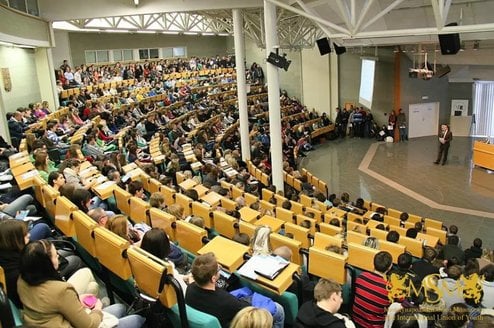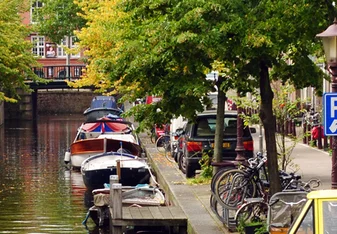Study Abroad Programs in Switzerland
Study Abroad in Switzerland
Pagination
About
Switzerland, die Schwiez, La Suisse or Svizzzera; however you call it, snow-covered Alpine peaks, geopolitical neutrality, high-tech watches, gourmet chocolate, yodeling mountaineers, and sophisticated banking are the Switzerland you know. However, Swiss institutions offer exciting academic and extracurricular opportunities to immerse yourself in the dynamic, youthful, and high-tech Switzerland that you have yet to discover.
Popular Destinations
Zurich
German-speaking Zürich is the largest city in Switzerland, sitting directly on Lake Zürich, and with large and efficient public transportation systems to get you wherever you need to go. Along with Bern, Zurich is a leading global city and among the world’s largest financial centers, with a very high quality of life. Stroll down the famous Bahnhofstrasse, visit the Zurich Museum of Art, the Chinese Garden, or any number of Zürich's festivals and parades year-round. Picture yourself in Zurich!
University of Zürich – Study in one of the world's most prestigious institutions in fields such as economics, humanities, law and the sciences. The largest university in Switzerland offers its 24,000 students more than 100 different degree programs and over 3,000 combinations of disciplines in seven faculties. Two thousand lecturers in 140 institutes provide the broadest range of subjects and courses available at any Swiss institution of higher education. Nine museums and collections, covering subjects from anthropology to zoology, constitute another valuable academic resource.
Bern
Study economics, politics, and the humanities in the exciting Swiss capital of Bern, where many international businesses and companies have made their home! This fourth most populous city in Switzerland offers both modern advances and opportunities for growth, surrounded by the natural beauty that Switzerland is known for. In 1983 the historic old town in the center of Bern became a UNESCO World Heritage Site, and Bern is ranked among the world’s top ten cities for the best quality of life. Come find out why!
University of Bern – The university enjoys excellent teaching quality and an intimate campus environment. It hosts two Centers of Competence in "Climate Science" and the National Center of Competence "North South" works on Governance and Conflict, Health and Sustainability. Bern's 14,000+ students can choose from 8 faculties and some 160 institutes. Research is also strong in Computer Science and Space Research. Theatre Studies are based in Bern uniquely. In 2008, the Humanities faculty founded the Center for Cultural Studies, Center for Global Studies and Center for the Study of Language and Society. Also enjoy modern sports facilities, tennis courts, a swimming pool, interior courts for volleyball, basketball, and other team sports.
Fribourg
Having official languages of both French and German, this central city is an exciting place to study pluralism and the effects of a bi-lingual society! Fribourg is nestled at the foot of the pre-Alps and like its sister city, Bern, Fribourg has preserved its medieval center. Students are invited to stroll the winding streets and visit any one of Fribourg's unique and diverse museums, theaters or its international film festival. Those interested in ice hockey or basketball will especially be attracted to the sports that the city has to offer!
Université de Fribourg - Fribourg is the only university in Western Europe that has instruction in both French and German. Total enrollment is 10,000 with about 1,500 international students. Fribourg is very strong in law, philosophy, and theology, emphasizing European law, comparative religions, and philosophies. Courses are often highly structured. Also of note are Fribourg’s Institute of Medieval Studies, the Institute of Eastern and Central Europe, the Federalism Institute, the Institute of Counseling in Family Matters, the Institute of Ethics and Human Rights, and the Institute of Sports.
Planning Your Trip
How to Choose a Program
When choosing a program, it's best to know what's out there (e.g. which programs offer courses in English, which programs take a hands-on approach to learning, etc.) Language, Academic Life, and Cultural Immersion are three areas with which any Swiss study abroad student should familiarize themselves.
Language: If asked what Switzerland's official language is, many would respond: French. However, they would only be partially correct. In fact, Sweden has four official languages: French, German, Italian, and Romansch. To accommodate such diversity, there are a variety of programs. Some focus strictly on intensive language study (ie: Learn French in Switzerland). Others offer general courses in one of the four official languages and in english; SIT's Global Health and Development program is one such program.
Academic Life: There are 12 recognized universities awarding doctorate degrees in Switzerland. Two of the 12 universities are Federal Institutes of Technology. About 100,000 students attend these academic institutions; 21% are international students (one of the highest percentages of foreign university students in the world for one country). Though a number of variations exist, most universities consist of the following faculties: theology, law and social sciences, arts, natural sciences, and medicine. In addition to the 12 universities mentioned above, there are also 9 universities of applied sciences, 14 universities of teacher education, and several university institutes receiving financial support from the Swiss Confederation.
Immersion and cultural activities: Although you might not live on campus, you will have opportunities to meet Swiss students as well as other international students. Almost all universities have sports grounds and sports associations. At each institution, you will find a number of different clubs and activity groups that provide a good opportunity for you to meet people and to do things that you enjoy. Even if you are not a "joiner" and clubs do not particularly appeal to you, you should nevertheless get involved in things that interest you. The Associations d'Étudiants, Fédérations des associations d'étudiants and Sociétés d'étudiants are organized according to the particular faculté under which you are studying.
Scholarships
Scholarships are great for overcoming the financial hurdle that sometimes accompanies study abroad adventures. Thankfully, there are government, independent program, and college scholarships from which to choose. Here are but a few of the options out there.
- The International Honors Program (IHP) scholarships are available based on financial need and on acceptance into an IHP program.
- AAUW International Project Grants are available to women who use their study abroad experience to improve their home country.
- More Study Abroad Grants and Scholarships





















